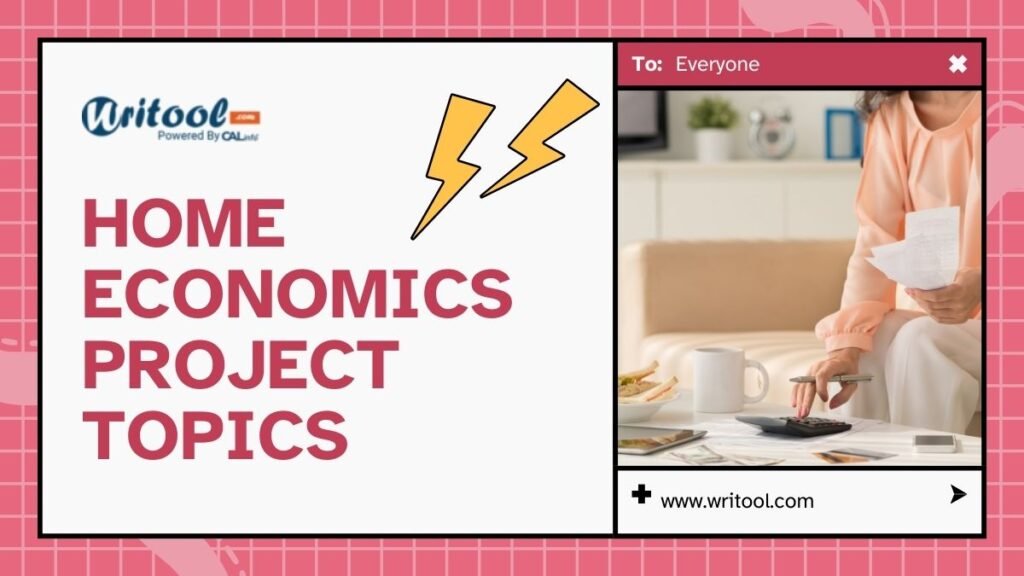Discover captivating home economics project topics that transcend the mundane. Delve into realms such as fashion design, culinary science, and interior décor transformations. Immerse yourself, acquire new knowledge, and unleash your inventive spirit!
Home economics transcends mere household tasks—it’s a canvas for your imagination and practical abilities to flourish. This handbook serves as your gateway to exciting projects that push boundaries, allowing you to explore your genuine passions.
Are you passionate about fashion? Ever considered creating your own wardrobe pieces? Or perhaps you’re a culinary enthusiast fascinated by the scientific principles underlying cooking techniques.
Contained within, you’ll uncover a plethora of ideas tailored to your interests. Each project presents an opportunity to expand your horizons and exhibit your skills.
What are Home Economics Projects?
Home economics projects are student-driven explorations in practical skills. They let you apply what you’ve learned in real life.
Here’s why they’re special:
| Aspect | Description |
|---|---|
| Practical Skills | Home economics teaches essential life skills. Projects let you use these skills practically, like budgeting for meals or sewing clothes. |
| Exploration and Creativity | Projects encourage you to explore topics deeply and get creative. You might experiment with recipes or redesign a room. |
| Problem-Solving | Projects challenge you to solve problems. You’ll identify issues, find solutions, and make decisions, such as creating budget meal plans or finding eco-friendly cleaning products. |
| Project Management | They teach planning and communication. You’ll set goals, manage time, and document your progress. |
The Scope of Home Economics
Home economics, or Family and Consumer Sciences (FCS), covers essential life skills beyond chores. Here’s what it includes:
| Category | Subtopics |
|---|---|
| Food and Nutrition | Eating healthy and cooking safely. |
| Budgeting for groceries and planning meals. | |
| Clothing and Textiles | Sewing basics and fashion choices. |
| Understanding fabrics and sustainable fashion. | |
| Housing and Home Management | Budgeting for household expenses. |
| Designing and cleaning your living space. | |
| Family and Consumer Issues | Parenting skills and consumer rights. |
| Communication and social issues. | |
| Life Skills | Decision-making and problem-solving. |
| Personal hygiene and career options. |
Importance of Home Economics Project Topics
Home economics projects offer more than grades; they’re crucial for your growth. Here’s why:
| Aspect | Description |
|---|---|
| Understanding | Dive deep into topics you love for real-world know-how. |
| Life Skills | Learn budgeting, time management, and practical skills. |
| Creativity | Solve problems with innovative thinking. |
| Confidence | Take charge and boost your self-belief. |
| Communication | Sharpen your speaking skills. |
| Passions | Discover what you love. |
| Future | Impress colleges and employers. |
| Learning | Stay curious and keep growing. |
Home Economics Project Topics
Check out home economics project topics:-
Food and Nutrition
- Creating a balanced meal plan.
- Benefits of organic foods.
- Effects of cooking methods on nutrients.
- Healthy snacks for children.
- Importance of food labels.
- Food preservation techniques.
- Impact of fast food on health.
- Cookbook of healthy recipes.
- Food allergies exploration.
- Cultural significance of food.
Textiles and Clothing
- Sustainable fabric garment design.
- History of fashion exploration.
- Environmental impact of fashion.
- Wardrobe planning.
- Role of clothing in self-expression.
- Garment care importance.
- Costume design for theater.
- Traditional textile arts.
- Psychology of color in fashion.
- Fashion lookbook creation.
Family and Consumer Sciences
- Effective family budgeting.
- Impact of technology on family.
- Home organization system design.
- Benefits of meal planning.
- Time management for families.
- Healthy family relationships guide.
- Challenges faced by modern families.
- Advertising impact on consumers.
- Eco-friendly cleaning product design.
- Mealtime rituals importance.
Home Management
- Household budget planning.
- Interior design principles.
- Sustainable home energy.
- Home workspace design.
- Impact of clutter on mental health.
- Home safety practices.
- Benefits of gardening.
- Effective waste management.
- Home ventilation importance.
- Indoor air quality maintenance.
Consumer Education
- Consumer rights understanding.
- Impact of advertising on behavior.
- Principles of ethical consumerism.
- Consumer education campaign.
- Brand loyalty effects.
- Psychology of pricing.
- Responsible online shopping guide.
- Product packaging impact.
- Budget-friendly shopping tips.
- Minimalism in consumerism.
Health and Wellness
- Fitness plan creation.
- Mindfulness benefits.
- Importance of sleep.
- Effects of stress.
- Healthy work-life balance.
- Relaxation techniques exploration.
- Hydration importance.
- Preventing household injuries.
- Mealtime rituals importance.
- Outdoor activities benefits.
Hospitality and Tourism
- Themed dinner party menu.
- Tourism impact on economy.
- Sustainable tourism principles.
- Customer service in hospitality.
- Budget-friendly vacation planning.
- Cultural significance of cuisines.
- Tea or coffee culture exploration.
- Small catering business plan.
- Social media impact on travel.
- Culinary tourism benefits.
Financial Literacy
- Credit score understanding.
- Investing in stock market basics.
- Passive income exploration.
- Managing student loans.
- Inflation effects on finances.
- Emergency funds importance.
- Money-saving methods.
- Budget tracking apps benefits.
- Retirement savings planning.
- Financial literacy impact.
Environmental Sustainability
- Waste reduction strategies.
- Sustainable agriculture principles.
- Composting benefits.
- Plastic pollution impact.
- Energy consumption reduction.
- Carbon footprint understanding.
- Renewable energy advantages.
- Community garden design.
- Deforestation effects.
- Sustainable fashion principles.
Culinary Arts
- Balanced meal menu design.
- Cuisine history exploration.
- Food presentation art.
- Food safety principles.
- Meal planning and shopping.
- Home cooking benefits.
- Food-themed event organization.
- Baking science understanding.
- Food advertising effects.
- Cultural and social food aspects.
Personal Development
- Goal setting guide.
- Lifelong learning benefits.
- Self-care practices.
- Positive thinking effects.
- Time management tips.
- Mindfulness benefits.
- Hobbies and interests impact.
- Building self-confidence guide.
- Social media impact on self-esteem.
- Volunteering benefits.
Child Development
- Child development stages guide.
- Technology impact on children.
- Play-based learning benefits.
- Early education importance.
- Safe and stimulating environment.
- Nutrition in child development.
- Outdoor play benefits.
- Positive discipline techniques.
- Media exposure effects.
- Parental involvement significance.
Community Development
- Community clean-up event planning.
- Sustainable community principles.
- Community gardens benefits.
- Local businesses impact.
- Cultural diversity promotion.
- Community centers role.
- Volunteering in communities.
- Community-based project initiation.
- Gentrification effects.
- Community-based tourism principles.
Career Development
- Resume writing guide.
- Internship benefits.
- Networking principles.
- Social media job search impact.
- Professional skills development.
- Mentorship benefits.
- Professional development importance.
- Job interview preparation.
- Career choice impact.
- Work-life balance understanding.
Global Citizenship
- Global issues understanding.
- Cultural diversity appreciation.
- Sustainable development goals exploration.
- Globalization effects.
- Human rights promotion.
- Education role in global citizenship.
- Cross-cultural communication benefits.
- Responsible travel practices guide.
- Poverty and inequality impact.
- Ethical consumption principles.
Public Health
- Common illness prevention.
- Disease prevention and control principles.
- Vaccination programs benefits.
- Lifestyle choices impact.
- Mental health awareness promotion.
- Community health centers role.
- Exercise benefits.
- Healthy aging guide.
- Environmental pollution effects.
- Emergency preparedness principles.
Physical Education and Sports Science
- Personal fitness program design.
- Sports nutrition principles.
- Sports psychology benefits.
- Sports injuries effects.
- Sports-related injury prevention.
- Physical education role.
- Team sports social benefits.
- Sports performance enhancement.
- Exercise mental health effects.
- Sports biomechanics principles.
Technology and Innovation
- Emerging technologies understanding.
- Digital literacy principles.
- Technology benefits in education.
- Social media impact.
- Responsible technology use plan.
- Artificial intelligence role.
- Smart home technologies benefits.
- Online safety and security guide.
- Technology addiction effects.
- Sustainable technology principles.
Education and Teaching
- Lesson planning guide.
- Classroom management principles.
- Differentiated instruction benefits.
- Technology in the classroom impact.
- Inclusive learning environments creation.
- Assessment role in learning.
- Professional development for teachers benefits.
- Parent-teacher communication guide.
- Standardized testing effects.
- Lifelong learning for educators principles.
Arts and Crafts
- Learning a new craft or hobby guide.
- Art therapy principles.
- Creative expression benefits.
- Arts education impact on academics.
- Community art project organization.
- Music relaxation benefits.
- Dance and movement therapy benefits.
- Creative business start-up guide.
- Visual arts impact on mental health.
- Sustainable art practices principles.
Home Economics Project Topics Based on Grades
Home economics project ideas based on grades:-
| Grade Level | Project Topics |
|---|---|
| Elementary Grades | Lunchbox Ideas: Plan healthy lunches. |
| Sewing Basics: Make a simple bag. | |
| Cookie Science: Learn about baking. | |
| Dream Bedroom: Design a bedroom. | |
| Composting: Start composting. | |
| Middle Grades | Budget Meal Plan: Plan meals on a budget. |
| Upcycled Clothes: Create new items from old clothes. | |
| Food Additives: Study food additives. | |
| Green Home: Design eco-friendly living spaces. | |
| Textile Basics: Learn about fabrics. | |
| High School Grades | Personalized Nutrition: Create a nutrition plan. |
| Fashion Design: Design and sew clothes. | |
| Food Preservation: Experiment with preserving food. | |
| Smart Home Tech: Explore smart home tech. | |
| Clothing Industry: Research ethical fashion. |
Home Economics Project Topics Based on Difficulties
Check out home economics project topics based on difficulties:-
| Level | Project Ideas |
|---|---|
| Beginner Level | Healthy Snacks: Make easy, nutritious snacks. |
| Basic Sewing: Learn simple stitches and sew something. | |
| Budget Meal Plan: Plan cheap meals for a week. | |
| Quick Recipes: Try fast and simple recipes. | |
| Pantry Organization: Organize pantry for easy use. | |
| Intermediate Level | Balanced Meal Plan: Plan meals for specific diets. |
| Clothes Upcycling: Make new things from old clothes. | |
| International Cooking: Cook a dish from another country. | |
| Natural Cleaning: Make cleaning stuff from natural things. | |
| Capsule Wardrobe: Pick versatile clothes for a collection. | |
| Advanced Level | Personalized Nutrition: Make a detailed eating plan. |
| Advanced Sewing: Sew a hard clothing item. | |
| Food Preservation: Try keeping food fresh longer. | |
| Smart Home Tech: Plan smart tech for a home. | |
| Sustainable Home Design: Make an eco-friendly house plan. |
What are the possible topic in home economics?
Check out the possible topics in home economics:-
| Category | Project Ideas |
|---|---|
| Food and Nutrition | Food Science: Explore baking soda’s effects. |
| Healthy Meal Plans: Plan diets like diabetic or vegetarian. | |
| Food Culture: Learn about food in different regions. | |
| Food Preservation: Compare canning and freezing. | |
| Food Impact: Analyze health and sustainability. | |
| Clothing and Textiles | Upcycling Clothes: Get creative with old clothes. |
| Historical Garments: Design period-inspired clothing. | |
| Fashion Ethics: Learn about fashion’s impact. | |
| Fabric Properties: Study different fabrics. | |
| Eco-Friendly Care: Develop green cleaning routines. | |
| Housing and Home Management | Dream Spaces: Design based on principles like minimalism. |
| Budget Renovations: Plan affordable upgrades. | |
| Smart Homes: Research tech for safety. | |
| Green Cleaning: Compare eco-friendly cleaners. | |
| Home Organization: Develop effective strategies. | |
| Family and Consumer Issues | Child Development: Understand parenting practices. |
| Responsible Buying: Learn about consumer rights. | |
| Interpersonal Skills: Discuss communication. | |
| Economic Impact: Research family economics. | |
| Financial Literacy: Learn budgeting skills. | |
| Life Skills | Basic Sewing: Learn for repairs or alterations. |
| Personal Care: Explore hygiene practices. | |
| Mental Health: Manage stress and mental well-being. | |
| Career Exploration: Research home-related careers. | |
| Decision Making: Develop problem-solving skills. |
How do I choose a project topic in economics?
Check out the best steps to choose a project topics in economics:-
| Step | Description |
|---|---|
| Find Your Interest | Explore what interests you: Are you into current events, historical models, or policy impacts? |
| Discover current economic issues: Look at news or blogs for topics like income inequality or climate change effects. | |
| Know Your Skills | Match skills to projects: If you like data, try economic data analysis. If you’re good at research, dive into economic history. |
| Learn new skills: Don’t shy away from challenges. Projects are chances to grow. | |
| Focus and Feasibility | Narrow down: A focused topic allows for deeper exploration. |
| Consider resources: Think about what you need to research. Do you have access to data or software? | |
| Project Ideas | Case studies: Look at specific events or company decisions and their effects. |
| Modeling: Use models to explore policy changes (pick one you can understand). | |
| Comparative studies: Compare economic systems or countries’ performance. | |
| Literature reviews: Analyze economists’ works and theories. | |
| Policy analysis: Evaluate existing policies and suggest improvements. | |
| Refine and Feedback | Talk to your teacher: Get their input on your ideas. |
| Be clear: Make sure your project has a clear question and method. |
What is home economics for primary school?
In primary school, home economics (also called life skills) teaches important basics in a fun way:
| Category | Description |
|---|---|
| Basic Skills | Food and Nutrition: Kids learn kitchen safety and healthy eating. |
| Clothing and Textiles: They try simple sewing and learn to care for clothes. | |
| Home Management: Children start organizing and doing easy cleaning tasks. | |
| Creativity and Problem-Solving | Arts and Crafts: Projects let them be creative and hands-on. |
| Problem-Solving: Activities teach budgeting and room design. | |
| Safety and Responsibility | Kitchen Safety: They learn to stay safe while cooking. |
| Hygiene: Kids understand keeping clean and healthy habits. | |
| Confidence and Independence | Independence: Kids do tasks on their own, building confidence. |
| Life Skills Base: These basics prepare them for later skills. |
What are the lessons in home economics?
Home economics, also known as Family and Consumer Sciences (FCS), covers key life skills:
| Category | Subtopics |
|---|---|
| Food and Nutrition | Healthy eating basics |
| Cooking skills | |
| Understanding food science | |
| Budget-friendly meal planning | |
| Clothing and Textiles | Sewing basics |
| Fashion principles | |
| Fabric properties | |
| Clothing care and budgeting | |
| Housing and Home Management | Financial planning |
| Interior design basics | |
| Cleaning and organization | |
| Sustainability practices | |
| Family and Consumer Issues | Child development basics |
| Consumer rights awareness | |
| Effective communication skills | |
| Understanding social and economic issues | |
| Life Skills | Decision-making and time management |
| Personal hygiene and stress management | |
| Career exploration | |
| Building confidence and self-reliance |
Conclusion
Home economics is a goldmine of project possibilities, whether you’re mastering cooking or delving into textile science. Whether you love fashion, sustainability, or finances, it’s your chance to shine.
Get creative! The best projects are the ones that spark your passion and let you contribute something special. So, explore, dive in, and embark on a journey that makes you informed and ready for whatever life brings.


